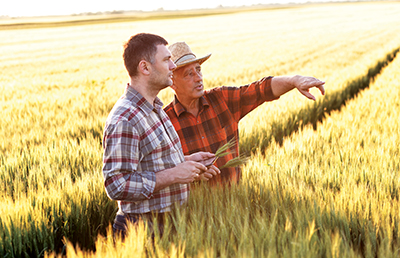Managing Risk is About More Than Hedging and Insurance

Thanks to Bethany Hearn, Principal and Leader of CLA’s Valuation, Forensics, Litigation and Investigations group, for the content of this post. Bethany routinely values farm operations and provides litigation support to farm families.
When we think of managing risk we often think of liability insurance related to vehicle accidents, puts, calls and options to manage price risk or setting up entity structures. But there are other kinds of risks that are housed in agriculture due to the general nature of the individuals that are part of this industry. In ag, a handshake and your word are generally deemed to be worth more than a piece of paper. To evaluate that question, let’s consider an example. You and your siblings own different pieces of equipment and share the equipment with each other for planting, harvesting, tillage, and transporting crops. You may have a different company set up to acquire the equipment or for hauling grain that family members use for both business and personal purposes. Maybe you formed a joint venture or partnership to run crop production activities through or you farmland for family members through a crop sharing arrangement.
Do any of these scenarios sound familiar? If so, you aren’t alone. These arrangements are common in family farm operations and may be based on generations of operating without formal agreements. However, do these unwritten rules put you or your farming operations at greater risk? Are they still ok today? Or does the lack of formal agreements put you at risk?
Some clients think of the old proverb “if it ain’t broke, don’t fix it”. However, digging deeper into the meaning of that proverb we find that it may really mean a desire to either avoid changing something that is already sufficient or avoid dealing with a potential conflict within the family. I am sure there are many verbal arrangements that work well and accomplish the goals of the parties involved. Unfortunately, the arrangements only work as long as all the parties get along. There are many life events that can cause friction between family members triggering disagreements on how the operating arrangements are being executed. Below are just a few:
- Death of a patriarch or matriarch. The loss of a family member is one of the most stressful life events. It is not surprising that we see family strife following the death of a family member especially if the death was a leader who may have been keeping the peace in the family.
- Another stressful life event that can cause issues with family farm operations especially when both spouses own an interest in the land, equipment or any entities or joint ventures that have been established.
- Severe illness or disability. What happens when Dad or Mom can’t do the work they used to do, but still have control of the operations. This often leads to strife with the younger generation who can feel like their “turn” has come but have not been given control of the reigns.
During or after these stressful times, the application of these verbal arrangements may come into question. Let’s consider an example. Several tracts of land were owned by different family members, many who did not participate in farming activities. The family members had one member of the family lease the property on a crop sharing basis without a formal agreement. This person also leased land from unrelated landowners. The only documentation related to the crop share arrangement for family members was an excel file allocating crop revenue and some expenses between the different farms. As that family member aged, his son took over the operations continuing to lease the property on a crop share basis. Without documentation on how revenue and expenses should be allocated, the allocation was not consistent from year to year. It is not surprising that the allocations became even more inconsistent after the father passed. Unfortunately, this situation ended in litigation between family members. This could have been avoided with a properly documented crop share agreement.
Formalizing agreements does not take the “family” out of the family farm. In fact, they might be necessary to save the family, especially when a succession event occurs. The agreements can protect both sides. In our example above a written document may have given the son a lifetime lease, thereby protecting his operation. At the same time, the siblings income stream is protected by a set of rules as to how income and expenses are to be allocated. What operations do you have with family members that are not documented in a formal agreement? Working with your attorney now to document these things will most likely save time and money later.
Kelly Jackson Hardy is a certified public accountant and business advisor specializing in income taxation, accounting services, and succession planning for farmers, privately-held elevators and supply dealers, and cooperatives. Kelly is a principal with CliftonLarsonAllen in Princeton, Illinois, as well as a regular speaker at tax and estate planning seminars. Kelly was raised on a hog, row crop and cattle farm in central Illinois and has been involved in the ag industry her entire life. Kelly, her husband, and two sons are active in 4-H and operate a small feeder calf operation and pumpkin business.

Comments are closed.